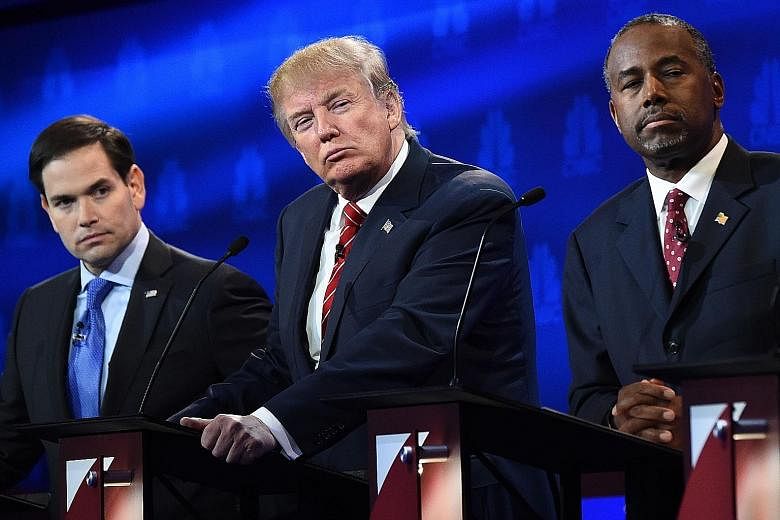One year can be a long time in politics, just ask the Republicans.
Last November, they were basking in their sweeping wins at the midterm congressional elections and revelling in what looked like a solid slate of presidential candidates comprising senators and ex-governors.
The strong ones were supposed to quickly whittle away the flawed ones - those with patchy records or clearly no qualifications to be president - leaving a core of establishment favourites to fight it out.
Instead, polls today provide for rather uncomfortable reading for the Grand Old Party. Two outsiders - businessman Donald Trump and surgeon Ben Carson - hold huge leads over the rest of the field.
According to the poll of polls compiled by RealClearPolitics, Dr Carson leads the way with 24.8 per cent of support, with Mr Trump a whisker behind with 24.6 per cent.
That means the two men, together with former Hewlett-Packard CEO Carly Fiorina, account for more than half of all those polled, with the 11 other mainstream candidates splitting the rest.
Those numbers are confounding political scientists at the moment, primarily because it defies everything everybody knows about the party. Said political watcher Allan Lichtman, professor of history at the American University in Washington: "You may think, oh, it's the Republican Party. They are the party that challenges Washington. This is not surprising... Nonsense. When was the last time the Republican Party nominated someone who had never held any kind of public office? The answer is never."
That Mr Trump would attract a lot of attention is not terribly surprising, but what is surprising is that he has held on to the lead this long.
"Usually what happens is that the more that gets reported on the candidates, the more they dig up things, that should... work against the candidates," said Dr Robert Shapiro, former chair of the department of political science at Columbia University. "What's striking here is that hasn't happened yet."
But on Friday, Dr Carson had to defend himself against suggestions he had lied about parts of his past, especially about being offered a prestigious military scholarship.
Perhaps due to the sheer history and logic-defying nature of the phenomenon, experts almost unanimously consider it unlikely that an outsider will clinch the nomination. Former establishment favourite Jeb Bush may be down, but he is not out, they say.
Nearly everyone believes that an establishment pick - likely Mr Bush or his now up-and-coming protege Marco Rubio - will rise to challenge the Trumps and the Carsons.
The test will come in February when voting at the primaries and caucuses begins.
Said Dr Justin H. Phillips, also from Columbia University: "I still think... there will be a viable insider establishment candidate who can still win this nomination just based on long-term and recent history of the Republican Party.
"They tend to love these mavericks but they never nominate them."
A big part of that argument is the significant moderating effect the nomination process can have. Voting in caucuses involves hours of protocol, speeches and ceremony, something that only party insiders tend to bother with. Success in a caucus thus tends to involve a strong traditional ground organisation rather than national popularity.
People who have run for office before have a clear advantage in figuring out how to run that ground campaign.
There is little consensus on how the relative chaos on the Republican side will impact the election. Some regard it as a boon for Democrats while others, like Professor Lichtman, play down its effects.
He says that while it is important for Democrats to avoid the same kind of infighting - no party holding the White House has survived an intra-party fight - it is less important for the party outside.
He points to 2008 when Republicans were in the White House and then senators Barack Obama and Hillary Clinton had a prolonged battle in the Democratic primaries. Mr Obama still won the presidency handily. "They can fight all they want and historically it makes absolutely no difference."

